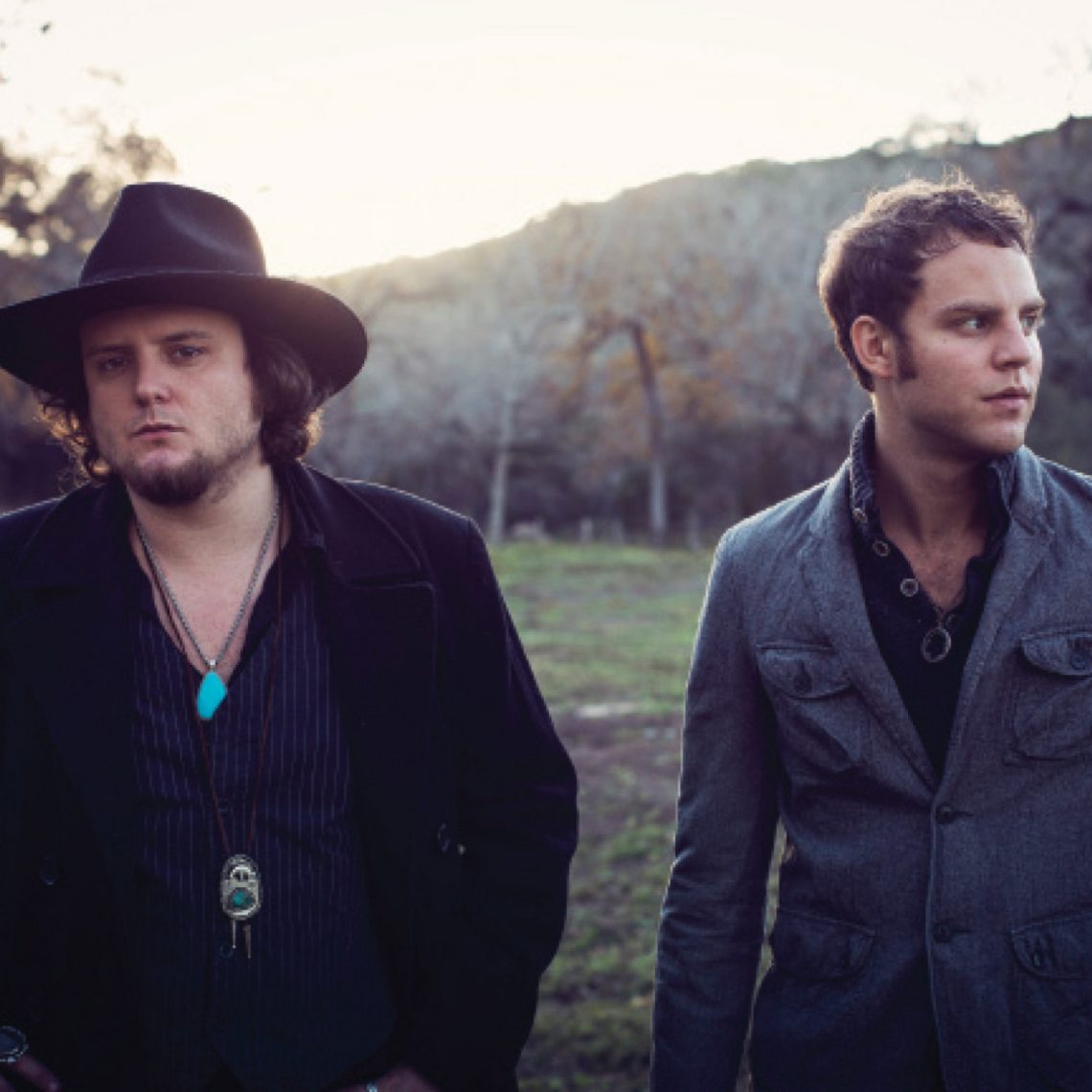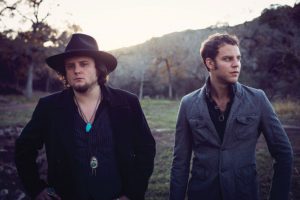By Kelly Dearmore
(March/April 2013/vol. 6 – Issue 2)
With hindsight, maybe it does sound a little over the top. Or maybe you just had to be there, whether squeezed into the overly packed crowd or looking out at it from the stage, hopped up to the sweat-stung eyeballs on a natural high of pure, adrenaline-addled musical delirium. But in the heat of the moment, that perfect moment when singer/guitarist Paul Cauthen of Sons of Fathers made the proclamation during the band’s blistering New Years Eve set at Austin’s the White Horse, it made beautifully profound sense.
“What’s going on in the White Horse, and all over East Austin with so many great artists, is a lot like what Paris in the 1920s was like,” he declared. “This is a special place, and we’re just happy to be a part of what’s going on here on this side of town.”
If you weren’t there that night, bear in mind that Cauthen’s words came across as a sincere compliment to the band’s attentive and appreciative crowd rather than any kind of generic stage-strutting bravado. But just the same, bold words indeed. In the swinging 1920s, at the height of the storied Jazz Age, there wasn’t a city on the map that could match the excitement, intrigue and rolling good times that Paris offered. Thanks to an extraordinary convergence of larger-than-life artistic characters seemingly drawn together by fate, France was about as cool as it got. American literary legends such as F. Scott Fitzgerald and Ernest Hemmingway drank, fought and discussed the meanings of life alongside the likes of revered painters Pablo Picasso and Henri Matisse. And oh, the music! “Paris in the 1920s” was just about the epicenter of everything that was bohemian, avant-garde, and splendid across the globe. To compare any scene to that scene is to take a mighty big step onto shaky ground.
But to their credit, neither Cauthen nor his Sons of Fathers partner, singer/upright bassist David Beck, back away from the statement when asked about it a month later. There’s no adrenaline at play now and no excited crowd to flatter; just two committed bandmates dutifully stuffing copies of their excellent new album, Burning Days, into envelopes destined for radio stations. But their conviction on the matter remains the same.
“So many crazy writers and artists in the 1920s were drawn to Paris,” Cauthen says. “There was an artistic movement and an overturn of the old with a new vibe of artistic expression. And I feel like we’ve come to a point now where things are beginning to overturn here, too. As a community, we’ve done as much as can be done with the blues and blues-based bands. We’ve also built as many bands as we can with the 4-4, straight-up old-school George Strait country sound, too. Here, in East Austin, people are attracted to the weirdest stuff, and they want to hear something unusual and new.”
And not just some people, adds Beck, but seemingly, a lot of people. It’s a rare case of quantity matching quality.
“It’s so dense in East Austin,” he says. “You go to other cities, and there will be one or two cool clubs or bars, but here, there’s a line of cool places, full of unique people with ideas who are quick to adopt other new ideas and change if they want to. It blows my mind how many people here aren’t afraid to try something new.”
“So many people are putting their heart into their art in many new ways,” says Cauthen, “and when that happens, magic happens.”
As jazzed as they are to be participants in that bustling East Austin renaissance, though, Beck and Cauthen are still just as much a part of the scene they sprang from a half-hour south. Strictly speaking, that’s where their magic first happened.
“San Marcos was the birthplace of Sons of Fathers,” says Cauthen of his fortuitous teaming with Beck back in 2010. Beck grew up there, surrounded by music and musicians his entire life: he’s the son of David Whitbeck, longtime bassist for Robert Earl Keen, and a childhood friend of fellow songwriter’s kid-turned-songwriter HalleyAnna Finlay. Cauthen, who grew up in Tyler and learned guitar from his preacher grandfather, found his own way to San Marcos in his early 20s.
“I never went to school there, but I was searching for the right players, then I found David and it all began to fall together,” he says. “San Marcos is a magical place. You meet your life friends there, you play Cheatham Street, walk the railroad tracks, float the river, get inspired to write, then add to the collection of the songs that have been birthed there already.”
Once the two connected and started writing together (and by happy accident, discovered their knack for tight harmonies), Beck and Cauthen wasted little time in stirring up an organic buzz around San Marcos, Austin, and the rest of the Hill Country. By the time they released their self-titled debut (co-produced by the duo with Lloyd Maines) in October 2011, that buzz had spread well outside of Texas — sometimes penetrating new territories well ahead of Sons of Fathers themselves. They’re a bit more used to that notion now, but earlier on, the boys knew they were doing something right when they started to surprise themselves in cities where they weren’t so sure there would be more than a few people waiting for them.
“Aspen seems to love us,” says Cauthen. “The last time we were there, we played at the [450-person capacity] Belly-Up Tavern, and we were 15 people shy of selling the place out on a Tuesday. We’re really lucky to have people that far away embrace us like that.” Beck adds that “Colorado, in general, seems to be really receptive to what we’re doing, which is pretty wild.” (Not surprisingly, they played to a packed Grand Ballroom at this year’s MusicFest in Steamboat Springs.)
About the only serious bump in the road early on was a name change. They originally went by the handle Beck and Cauthen, but swapped it for Sons of Fathers (after their song of the same name) when indie-rocker Beck (“Loser”) issued them a cease-and-desist letter. Absurd, yes, but no matter; Sons of Fathers had a nice ring to it, and they figured it’d fit a little better for the occasions when Beck and Cauthen flesh out their sound with a full band.
While traveling the states and gaining fans from the worlds of country, indie-rock and folk along the way has helped Sons of Fathers build a name for themselves, they knew that it would be back in Austin where they would look to record the new album (again with Maines) and hopefully grow bigger and better than they have to this point. Given that their band has been a DIY-style operation since its inception, Cauthen and Beck have found no reason to change that up by teaming up with a record label.
“Dave and I have put everything we have on the line for this band, and for this new record, especially,” says Cauthen. “We’ve had labels knocking on our door, but we’re keeping it just for us, the band and our fans.”
As with the debut, which was well-received by fans and critics of many musical styles, Burning Days (out April 2) is as much of a country album as it is a rock album, a blues album, or an acoustic-roots album — though the divergent styles blend together as naturally as Beck and Cauthen’s vocals.
“We certainly have musical roots in country music, because we’re from Texas,” says Beck. “But we’ve never closed ourselves off. When we’ve traveled out west, specifically, we listen to all kinds of crazy stuff that people introduce us to. We make our music from the base of many American styles, and I think that’s why people who like a wide range of music like us also.”
As comfortable as they are mixing their myriad influences together into an eclectic whole, the stylistic range has also served them well in situations where they’ve needed to adapt to specific crowds. “We’ve had to be chameleons in the music industry,” explains Cauthen. “We play all kinds of honky-tonks and clubs. If you start blasting screaming-loud music during an afternoon show at Gruene Hall, Tracie [Ferguson, booking agent], will come and make you turn it down and change it up. We adapt to where we’re playing and to the audience — whether its crazy frat kids or crazy hippies, we like to play to them all and try to win them over.”
The debut album may have made for a strong first impression, but Burning Days improves upon Sons of Fathers across the board. The blend of styles from song to song feels even more second nature, the writing more confident, the sound more fully formed, and the harmonies stronger than ever, whether powerfully anthemic or sweetly somber.
“A big reason why this record sounds so great is that Dave and I have grown comfortable singing with each other,” Cauthen says. “We’ve always felt that if we’re not progressing, we’re going backwards. We wrote 30 new songs for this record, and when we went into the studio with Lloyd, he immediately helped us narrow it down to 10.”
The guys made the most of the resources available to them when recording, and found that for the most part, the simpler the answer, the better the result.
“A lot of the songs [versions] on the record weren’t actually intended for this record,” Beck says. “We’d write a song, then within 24 hours we’d record it in a studio that our friend has. As time went on, we went to a higher-dollar studio to record some of those songs over and we couldn’t capture the same magic and authenticity of the first cuts we had already recorded in our friend’s smaller studio.”
Cauthen looks back and knows that the vital spark that was missing on the re-worked versions of those songs was due to their fiddling with a product that was already finished, even if it wasn’t a perfectly cut diamond.
“What we had after the first takes are called ‘true cuts’,” he says. “There were times when, on a whim, Dave and I would go record at 2 in the morning in that damn garage. When you start looking at third and fourth takes, you can start falsifying the truth of the song.”
In terms of the songwriting, truth was the only real inspiration behind the lyrics and stories featured on Burning Days. “We wrote about life as we were going though it at the time,” Cauthen says. “It happened to be a crazy freaking time. Some things that happened we regret, but hey, we’re human and we mess up sometimes. It’s all very real.”
Beck agrees with a nod. “That type of honest writing should be a regular thing for any artist,” he says. And that same honesty is sewn right into the music, too.
“The lyrics brought in the beat and the beat brought in other parts, like the piano, and the music organically happened that way,” Cauthen explains. “You’ll hear progression on this record. It’s a new kind of monster. The first album is great in its own light, but this new one is just … awesome.”
There he goes again, making another one of those bold, caution-thrown-to-wind kind of statements that all but begs for a skeptical challenge. But this one won’t require any further elaboration from Cauthen or Beck: the defense rests on the music alone.







No Comment